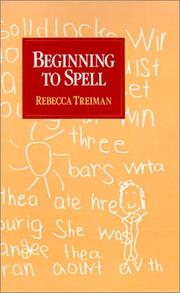| Listing 1 - 6 of 6 |
Sort by
|

ISBN: 0195062191 9780195062199 9780195362831 0195362837 1280524480 9781280524486 9786610524488 6610524483 0197560148 1601297564 Year: 1993 Publisher: New York, New York ; Oxford, [England] : Oxford University Press,
Abstract | Keywords | Export | Availability | Bookmark
 Loading...
Loading...Choose an application
- Reference Manager
- EndNote
- RefWorks (Direct export to RefWorks)
This groundbreaking study on the psycholinguistics of spelling presents the author's original empirical research on spelling and supplies the theoretical framework necessary to understand how children's ability to write is related to their ability to speak a language. The author explores areas in a field dominated by work traditionally concerned with the psychodynamics of reading skills and, in so doing, highlights the importance of learning to spell for both psycholinguists and educators, since as they begin to spell, children attempt to represent the phonological, or sound form, of words.
Orthography --- Didactics of English --- English language --- First grade (Education) --- Orthography and spelling --- Study and teaching (Primary) --- First grade (Education). --- Study and teaching (Primary). --- Psycholinguistics. --- Language, Psychology of --- Language and languages --- Psychology of language --- Speech --- Linguistics --- Psychology --- Thought and thinking --- Study and teaching (Elementary) --- Psychological aspects --- Education, Primary --- Germanic languages
Book
ISBN: 9789048149988 Year: 2010 Publisher: Dordrecht : Kluwer,
Abstract | Keywords | Export | Availability | Bookmark
 Loading...
Loading...Choose an application
- Reference Manager
- EndNote
- RefWorks (Direct export to RefWorks)
Book
ISBN: 9780199907977 0199907978 Year: 2014 Publisher: Oxford Oxford University Press
Abstract | Keywords | Export | Availability | Bookmark
 Loading...
Loading...Choose an application
- Reference Manager
- EndNote
- RefWorks (Direct export to RefWorks)
95
Children --- English language --- Enfants --- Writing --- Orthography and spelling --- Écriture --- Psycholinguistics --- Orthography --- Écriture. --- Schrijven --- Kinderen --- Schrijfstoornissen --- Kind --- Schrijfstoornis --- Jeugd --- Media --- Ontwikkelingsstoornis --- Fysiotherapie
Book
ISBN: 9780199324576 9780190236540 0199324573 Year: 2015 Publisher: Oxford Oxford University Press
Abstract | Keywords | Export | Availability | Bookmark
 Loading...
Loading...Choose an application
- Reference Manager
- EndNote
- RefWorks (Direct export to RefWorks)
Writing is one of humankind’s greatest inventions, and modern societies could not function if their citizens could not read and write. How do skilled readers so quickly pick up meaning from squiggles on a page, and how do children learn to do so? These questions have been studied in fields ranging from vision science to cognitive psychology to education. The chapters in this Handbook synthesize the research on these topics, focusing on how studies using a cognitive approach can shed light on how the reading process works in skilled readers and how children learn to read. To set the stage, the first few chapters of the Handbook present information about writing systems and about methods of studying reading, including those that examine speeded responses to individual words and those that use eye movement technology to examine the reading of sentences and texts. The chapters in the following section focus on the identification of single words by skilled readers. Insights that have been gained from studies of adults with reading disabilities due to brain damage are also discussed. Another section of the Handbook considers the silent reading of text by skilled readers. The chapters in this section address such issues as the role of sound in silent reading and how readers’ eyes move through texts, and detailed quantitative models of the reading process are proposed in some chapters. How children learn to read and spell and how they should be taught to do so is the focus of the chapters in the final sections of the Handbook. These chapters review research with learners of different languages and those who speak different dialects of a language; they discuss both typically developing children and children with specific disabilities in reading. These chapters also address questions about how reading should be taught with populations ranging from preschoolers to adolescents, and they show how research findings have influenced education.
Reading --- Psychological aspects --- Reading, Psychology of. --- Psycholinguistics --- Psychological study of literature --- Language arts --- Elocution --- Psychological aspects. --- Study and teaching --- E-books --- Lezen --- Leesstoornissen --- Leesstoornis --- Schrijven --- Spel --- Reading - Psychological aspects
Book
ISBN: 0190228423 0199907986 9780199907984 9780199907977 0199907978 Year: 2014 Publisher: New York : Oxford University Press,
Abstract | Keywords | Export | Availability | Bookmark
 Loading...
Loading...Choose an application
- Reference Manager
- EndNote
- RefWorks (Direct export to RefWorks)
Mastering the writing system of one's language is crucial for success in a modern society. This book examines how children learn to produce writing. It provides a novel theoretical framework that integrates findings from a wide range of age groups - from children who are producing their first scribbles to experienced spellers who are writing complex words. The book is unique in the range of topics and languages that it covers. Also unique is the way in which it integrates linguistic insights about the nature of writing systems with discussions of literacy development in children.
Children --- English language --- Writing --- Writing. --- Orthography and spelling. --- Spelling --- Germanic languages
Book
ISBN: 0805801138 Year: 1992 Publisher: Hillsdale, N.J. : L. Erlbaum Associates,
Abstract | Keywords | Export | Availability | Bookmark
 Loading...
Loading...Choose an application
- Reference Manager
- EndNote
- RefWorks (Direct export to RefWorks)
Language acquisition --- Reading --- Langage --- Lecture --- Congresses --- Acquisition --- Congrès
| Listing 1 - 6 of 6 |
Sort by
|

 Search
Search Feedback
Feedback About UniCat
About UniCat  Help
Help News
News